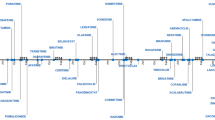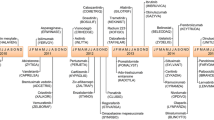Abstract
First-in-human (FIH) dose-escalation trials on oncology should prioritize safety and emphasize efficacy. We reviewed the FIH trials of 67 anti-tumor products approved by the Food and Drug Administration between 2018 and 2023 and found that the “3 + 3” design remains the predominant dose-escalation method (66.2%). The number of patients receiving sub-therapeutic doses is positively correlated with the maximum tolerated dose (MTD) or maximum dose (MD) to starting dose ratio (P = 0.056) and the number of dose levels in trials (P < 0.001). In addition, the proportion of products with a high ratio in antibody drugs is higher than that in small molecules (P < 0.001). The MTD or MD exceeded the label dose by three or more doses in 22.03% of the products. In conclusion, optimizing the starting dose selection method, refining the way of determining doses, and finding alternative indicators to replace toxicity as the endpoints will increase the effectiveness and broaden the beneficiary scope.




Similar content being viewed by others
References
Revised guideline on first-in-human clinical trials. In: European Medicines Agency [database online]. European Union. https://www.ema.europa.eu/en/news/revised-guideline-first-human-clinical-trials. Accessed 13 Apr 2023.
Le Tourneau C, Lee JJ, Siu LL. Dose escalation methods in Phase I cancer clinical trials. J Natl Cancer Inst. 2009;101(10):708–20. https://doi.org/10.1093/jnci/djp079.
Salzberg M. First-in-human phase 1 studies in oncology: the new challenge for investigative sites. Rambam Maimonides Med J. 2012;3(2):e0007. https://doi.org/10.5041/RMMJ.10074.
Rogatko A, Schoeneck D, Jonas W, Tighiouart M, Khuri FR, Porter A. Translation of innovative designs into phase I trials. J Clin Oncol. 2007;25(31):4982–6. https://doi.org/10.1200/JCO.2007.12.1012.
Simon R, Freidlin B, Rubinstein L, Arbuck SG, Collins J, Christian MC. Accelerated titration designs for phase I clinical trials in oncology. J Natl Cancer Inst. 1997;89(15):1138–47. https://doi.org/10.1093/jnci/89.15.1138.
Le Tourneau C, Gan HK, Razak AR, Paoletti X. Efficiency of new dose escalation designs in dose-finding phase I trials of molecularly targeted agents. PLoS ONE. 2012;7(12): e51039. https://doi.org/10.1371/journal.pone.0051039.
Guideline, ICH Harmonised Tripartite. Nonclinical evaluation for anticancer pharmaceuticals S9. In: International Conference on Harmonization, 2009.
Guideline, ICH Harmonised Tripartite. Preclinical safety evaluation of biotechnology-derived pharmaceuticals S6 (R1). In: Proceedings of the International Conference on Harmonisation of Technical Requirements for Registration of Pharmaceuticals for Human Use. 2011.
Guideline, ICH Harmonised Tripartite. Guidance on nonclinical safety studies for the conduct of human clinical trials and marketing authorization for pharmaceuticals M3 (R2). In: International Conference on Harmonisation of Technical Requirements for Registration of Pharmaceuticals for Human Use. 2009.
Food, Saudi. Guideline on strategies to identify and mitigate risks for first-in-human and early clinical trials with investigational medicinal products. 2017.
Suh HY, Peck CC, Yu KS, Lee H. Determination of the starting dose in the first-in-human clinical trials with monoclonal antibodies: a systematic review of papers published between 1990 and 2013. Drug Des Dev Ther. 2016;10:4005–16. https://doi.org/10.2147/DDDT.S121520.
Stebbings R, Poole S, Thorpe R. Safety of biologics, lessons learnt from TGN1412. Curr Opin Biotechnol. 2009;20(6):673–7. https://doi.org/10.1016/j.copbio.2009.10.002.
Le Tourneau C, Stathis A, Vidal L, Moore MJ, Siu LL. Choice of starting dose for molecularly targeted agents evaluated in first-in-human phase I cancer clinical trials. J Clin Oncol. 2010;28(8):1401–7. https://doi.org/10.1200/JCO.2009.25.9606.
Mittapalli RK, Yin D, Beaupre D, Palaparthy R. Starting dose selection and dose escalation for oncology small molecule first-in-patient trials: learnings from a survey of FDA-approved drugs. Cancer Chemother Pharmacol. 2021;87(1):23–30. https://doi.org/10.1007/s00280-020-04202-0.
Eskens FA, de Jonge MJ, Bhargava P, Isoe T, Cotreau MM, Esteves B, et al. Biologic and clinical activity of tivozanib (AV-951, KRN-951), a selective inhibitor of VEGF receptor-1, -2, and -3 tyrosine kinases, in a 4-week-on, 2-week-off schedule in patients with advanced solid tumors. Clin Cancer Res. 2011;17(22):7156–63. https://doi.org/10.1158/1078-0432.CCR-11-0411.
Le Tourneau C, Razak AR, Gan HK, Pop S, Diéras V, Tresca P, et al. Heterogeneity in the definition of dose-limiting toxicity in phase I cancer clinical trials of molecularly targeted agents: a review of the literature. Eur J Cancer. 2011;47(10):1468–75. https://doi.org/10.1016/j.ejca.2011.03.016.
Goodman SN, Zahurak ML, Piantadosi S. Some practical improvements in the continual reassessment method for phase I studies. Stat Med. 1995;14(11):1149–61. https://doi.org/10.1002/sim.4780141102.
Neuenschwander B, Branson M, Gsponer T. Critical aspects of the Bayesian approach to phase I cancer trials. Stat Med. 2008;27(13):2420–39. https://doi.org/10.1002/sim.3230.
Berry SM, Carlin BP, Lee JJ, Muller P. Bayesian adaptive methods for clinical trials. Boca Raton: CRC Press; 2010.
Iasonos A, Wilton AS, Riedel ER, Seshan VE, Spriggs DR. A comprehensive comparison of the continual reassessment method to the standard 3 + 3 dose escalation scheme in Phase I dose-finding studies. Clin Trials. 2008;5(5):465–77. https://doi.org/10.1177/1740774508096474.
Penta JS, Rosner GL, Trump DL. Choice of starting dose and escalation for phase I studies of antitumor agents. Cancer Chemother Pharmacol. 1992;31(3):247–50. https://doi.org/10.1007/BF00685555.
Milton MN, Horvath CJ. The EMEA guideline on first-in-human clinical trials and its impact on pharmaceutical development. Toxicol Pathol. 2009;37(3):363–71. https://doi.org/10.1177/0192623309332997.
Zhao L, Ren TH, Wang DD. Clinical pharmacology considerations in biologics development. Acta Pharmacol Sin. 2012;33(11):1339–47. https://doi.org/10.1038/aps.2012.51.
Muller PY, Milton M, Lloyd P, Sims J, Brennan FR. The minimum anticipated biological effect level (MABEL) for selection of first human dose in clinical trials with monoclonal antibodies. Curr Opin Biotechnol. 2009;20(6):722–9. https://doi.org/10.1016/j.copbio.2009.10.013.
Weinberg WC, Frazier-Jessen MR, Wu WJ, Weir A, Hartsough M, Keegan P, et al. Development and regulation of monoclonal antibody products: challenges and opportunities. Cancer Metastasis Rev. 2005;24(4):569–84. https://doi.org/10.1007/s10555-005-6196-y.
Buoen C, Bjerrum OJ, Thomsen MS. How first-time-in-human studies are being performed: a survey of phase I dose-escalation trials in healthy volunteers published between 1995 and 2004. J Clin Pharmacol. 2005;45(10):1123–36. https://doi.org/10.1177/0091270005279943.
Margolin K, Synold T, Longmate J, Doroshow JH. Methodologic guidelines for the design of high-dose chemotherapy regimens. Biol Blood Marrow Transplant. 2001;7(8):414–32. https://doi.org/10.1016/s1083-8791(01)80009-4.
Parulekar WR, Eisenhauer EA. Phase I trial design for solid tumor studies of targeted, non-cytotoxic agents: theory and practice [published correction appears in J Natl Cancer Inst. 2004 Nov 3;96(21):1640]. J Natl Cancer Inst. 2004;96(13):990–7. https://doi.org/10.1093/jnci/djh182.
Cannistra SA. Challenges and pitfalls of combining targeted agents in phase I studies. J Clin Oncol. 2008;26(22):3665–7. https://doi.org/10.1200/JCO.2008.17.2676.
Acknowledgements
Not applicable.
Funding
The authors declare that no funds, grants, or other support were received during the preparation of this manuscript.
Author information
Authors and Affiliations
Corresponding author
Ethics declarations
Conflict of interest
The authors have no relevant financial or non-financial conflict of interests to disclose.
Ethics approval
It is not applicable for this article.
Compliance with ethical standards
It is not applicable for this article.
Informed consent
It is not applicable for this article.
Additional information
Publisher's Note
Springer Nature remains neutral with regard to jurisdictional claims in published maps and institutional affiliations.
Supplementary Information
Below is the link to the electronic supplementary material.
Rights and permissions
Springer Nature or its licensor (e.g. a society or other partner) holds exclusive rights to this article under a publishing agreement with the author(s) or other rightsholder(s); author self-archiving of the accepted manuscript version of this article is solely governed by the terms of such publishing agreement and applicable law.
About this article
Cite this article
Jiang, Z., Sun, W., Du, R. et al. A review of dose escalation for FDA-approved products treating solid tumors and hematological malignancies in first-in-human trials. Clin Transl Oncol (2024). https://doi.org/10.1007/s12094-024-03451-2
Received:
Accepted:
Published:
DOI: https://doi.org/10.1007/s12094-024-03451-2




